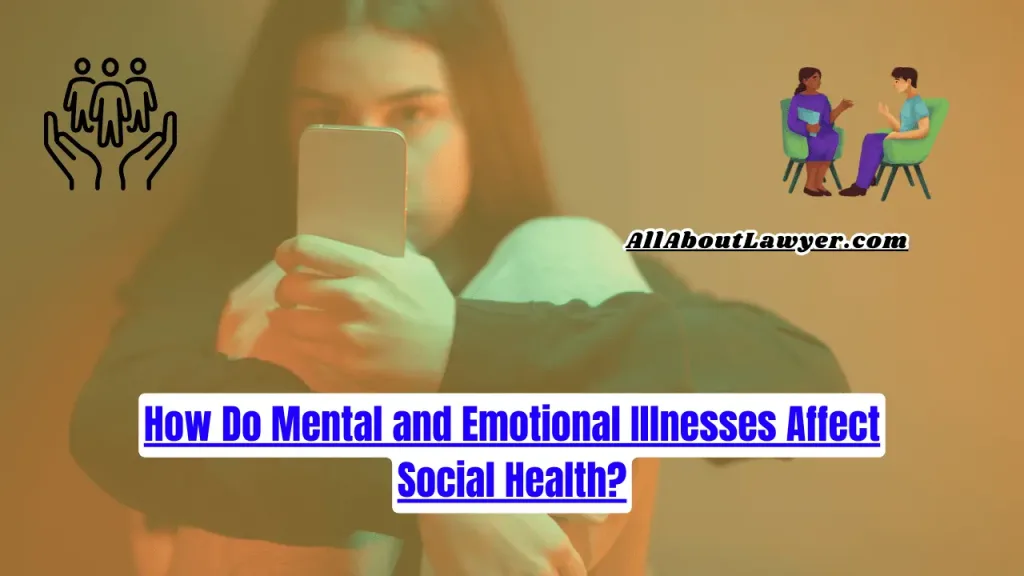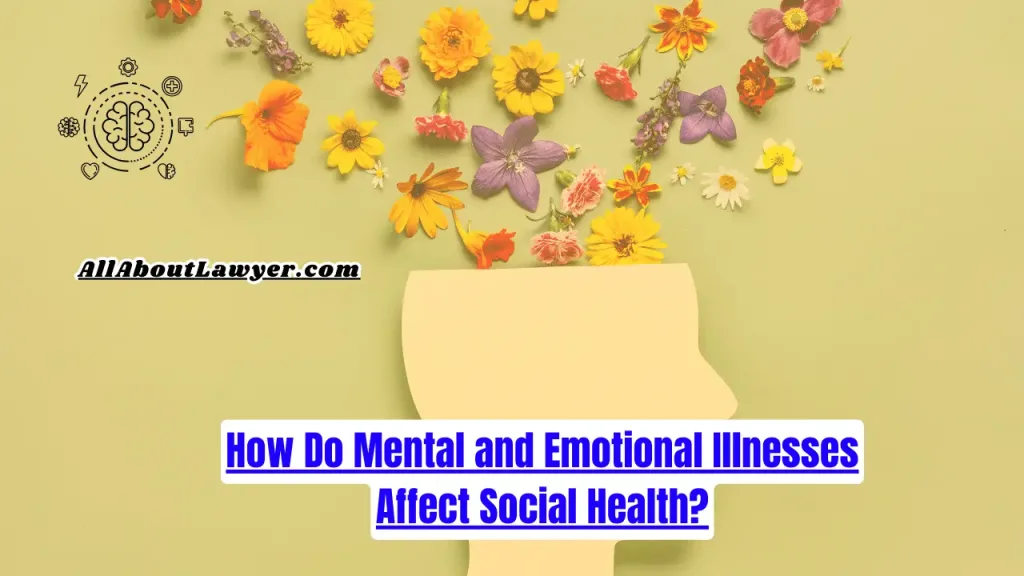How Do Mental and Emotional Illnesses Affect Social Health?
Mental and emotional health are two fundamental pillars that define a person’s well-being. While mental health encompasses our cognitive processes, emotional health refers to our ability to manage and express emotions. Both of these have a profound impact on social health—the way we interact, form relationships, and engage in our communities. This article explores how do mental and emotional illnesses affect social health, supported by research, statistics, and real-life examples. We will also delve into the issues caused by poor social health and offer strategies to improve it.
Table of Contents
First Understand Social Health
Social health refers to the ability to form meaningful relationships, maintain healthy communication, and engage confidently in social settings. According to the National Institutes of Health (NIH), social health is an essential aspect of overall well-being. It encompasses not only the ability to interact with others but also the sense of belonging in a community. Good social health allows individuals to navigate various social scenarios, fostering confidence and the ability to form strong bonds.
In contrast, poor social health can lead to isolation, strained relationships, and emotional problems. Loneliness, for instance, has been linked to various health complications, from emotional instability to life-threatening conditions like heart disease and cancer. Understanding how do mental and emotional illnesses affect social health is key to addressing these challenges.

Connection Between Mental Illness and Social Health
The relationship between mental illness and social health is a two-way street. Mental and emotional disorders can impair social functioning, while poor social health can exacerbate mental health conditions. For example, depression and anxiety may lead to social withdrawal, but long-term isolation can also trigger or worsen these mental health conditions. Below, we explore how do mental and emotional illnesses affect social health:
1. Reduced Social Interaction
Mental illnesses like depression and anxiety disorders can result in a lack of motivation to engage in social activities. Individuals with these conditions often withdraw from social gatherings, either because they feel overwhelmed or experience low self-esteem. A study published in the Journal of Anxiety Disorders (2020) found that people with social anxiety disorder (SAD) exhibited poorer nonverbal communication skills, such as reduced eye contact and gestures, further hindering their ability to interact socially. This is a key insight into how do mental and emotional illnesses affect social health.
2. Communication Difficulties
Mental illnesses also impact communication. For example, people with schizophrenia may struggle with expressing themselves coherently due to disorganized thoughts. Similarly, individuals with bipolar disorder may have difficulty communicating during manic episodes, where impulsivity prevails, or during depressive phases, where withdrawal is more common. Poor communication exacerbates social isolation and may lead to misunderstandings within relationships, demonstrating how do mental and emotional illnesses affect social health.
3. Strained Interpersonal Relationships
Mental and emotional illnesses frequently strain personal relationships, leading to conflicts within families, romantic partnerships, and friendships. Disorders such as borderline personality disorder (BPD) are characterized by emotional dysregulation, which can create emotional instability, irritability, and feelings of abandonment—leading to emotional outbursts that push loved ones away. Understanding how do mental and emotional illnesses affect social health through these examples is crucial to providing effective support.
A 2017 study published in Schizophrenia Research found that social withdrawal in individuals with schizophrenia often resulted in conflicts within close relationships, further underscoring how do mental and emotional illnesses affect social health.
Real-Life Example
Consider the case of Sarah, a 35-year-old teacher diagnosed with bipolar disorder. During manic episodes, she would act impulsively, often arguing with colleagues and friends. This created a sense of alienation as her coworkers distanced themselves, unsure how to handle her behavior. Over time, Sarah became increasingly isolated. It wasn’t until she started cognitive-behavioral therapy (CBT) and joined a support group that she learned coping mechanisms to manage her interactions and rebuild relationships, illustrating how do mental and emotional illnesses affect social health in real life.
The Vicious Cycle: Social Isolation and Mental Health
Humans are inherently social beings. When people become isolated, whether due to mental health challenges or external factors like discrimination or work pressures, it often leads to feelings of loneliness. Social isolation can worsen mental health by increasing the likelihood of developing disorders like depression, anxiety, and even addictions. This interconnection highlights how do mental and emotional illnesses affect social health by trapping individuals in a vicious cycle of mental and social decline.
A study by Harvard University found that loneliness increases the production of stress hormones like cortisol, which can lead to anxiety, depression, and even physical health problems like heart disease. Further research linked loneliness to suicidal ideation, especially in cases where individuals had faced romantic issues or were dealing with social isolation. This is yet another example of how do mental and emotional illnesses affect social health in both the emotional and physical realms.
Problems Caused by Poor Social Health
- Emotional Illnesses
Poor social health exacerbates emotional illnesses. People who are socially isolated are more likely to develop conditions like depression and anxiety. The lack of strong social bonds means they are less able to manage life’s stressors, leading to increased vulnerability to emotional distress. - Addictions
Individuals who feel lonely often turn to substances or behaviors to fill the void. Studies show a strong correlation between loneliness and addictions, whether it’s alcohol, drugs, or even digital addictions like smartphone and video game dependency. - Suicidal Thoughts
Lonely individuals are at higher risk of experiencing suicidal ideation. A report from The American Foundation for Suicide Prevention found that many people who attempted suicide had previously experienced social isolation. Understanding how do mental and emotional illnesses affect social health helps clarify the steps necessary for intervention. - Physical Health Issues
Heart failure, immune system dysfunction, and even cancer are linked to poor social health. One study showed that individuals with poor social health were 20% more likely to die from heart-related issues. Loneliness weakens the immune system, leading to greater susceptibility to diseases. - Memory Loss and Cognitive Decline
Poor social health has also been connected to memory loss and cognitive issues. Research published in The Journal of Aging and Health found that seniors with low levels of social interaction had an increased risk of developing dementia. - Work and Educational Performance
Employees and students with poor social health are likely to experience lower performance. Loneliness can make them feel detached from their workplace or school, reducing motivation, productivity, and success. A 2019 study found that lonely workers were 12% more likely to quit their jobs due to feelings of isolation, demonstrating how do mental and emotional illnesses affect social health in professional environments.

Addressing the Challenges: Treatment Options
Fortunately, there are several evidence-based treatment options available to help individuals manage their mental illnesses and improve social health:
- Cognitive Behavioral Therapy (CBT): Proven to help individuals with conditions like anxiety and depression by helping them change harmful thought patterns and behaviors.
- Interpersonal Therapy (IPT): Focuses on improving communication skills and strengthening relationships, which can be particularly helpful for those with emotional dysregulation.
- Medications: Antidepressants, anti-anxiety medications, and antipsychotics can help regulate mood and improve social functioning for people with mental health conditions.
- Support Groups: Joining support groups can provide a safe space for individuals to share their experiences, gain emotional support, and reduce feelings of isolation, further illustrating how do mental and emotional illnesses affect social health.
Promoting Social Health
Improving social health can positively influence mental well-being. Here are strategies that individuals can implement:
- Building Social Connections
Reaching out to friends, family, or even joining support groups can foster a sense of belonging. Engaging in social activities like volunteering or joining clubs helps to alleviate loneliness, addressing how do mental and emotional illnesses affect social health by fostering deeper connections. - Strengthening Relationships
Spending quality time with existing friends can deepen those bonds. Communication skills training can also be beneficial to those struggling with effective interaction. - Balancing Life and Work
Maintaining a healthy work-life balance is essential to avoid burnout, a major cause of social isolation. Simple adjustments like reducing work hours can free up time for socializing. - Seeking Professional Help
For those dealing with mental health disorders, seeking therapy or medication can be crucial in managing symptoms and improving social interaction. Learning how do mental and emotional illnesses affect social health can empower individuals to make positive changes in their lives.
Conclusion: A Holistic Approach to Well-Being
Mental and emotional illnesses profoundly impact social health, but addressing both aspects holistically can lead to better overall well-being. Whether through treatment, community support, or self-care strategies, individuals can improve their social functioning and lead fulfilling lives. As society continues to advance in mental health awareness, we can build communities that support both social and mental well-being, ensuring that individuals understand how do mental and emotional illnesses affect social health and find ways to improve their overall quality of life.
FAQs
How do mental illnesses affect relationships?
Mental illnesses can strain relationships due to communication difficulties, emotional instability, and social withdrawal, leading to conflicts and misunderstandings.
Can poor social health lead to physical health problems?
Yes, poor social health is linked to conditions like heart disease, weakened immune systems, and even increased risk of early mortality.
What are some strategies to improve social health?
Building strong relationships, improving communication skills, and seeking professional help are all effective ways to enhance social health.
How does loneliness affect mental health?
Loneliness increases stress hormones and can lead to emotional illnesses like depression and anxiety, creating a vicious cycle of social withdrawal and mental health decline.
How can someone with social anxiety improve their social interactions?
Gradual exposure to social situations, alongside therapy like CBT, can help individuals manage their symptoms and improve their social engagement.
About the Author

Sarah Klein, JD, is a licensed attorney and legal content strategist with over 12 years of experience across civil, criminal, family, and regulatory law. At All About Lawyer, she covers a wide range of legal topics — from high-profile lawsuits and courtroom stories to state traffic laws and everyday legal questions — all with a focus on accuracy, clarity, and public understanding.
Her writing blends real legal insight with plain-English explanations, helping readers stay informed and legally aware.
Read more about Sarah
